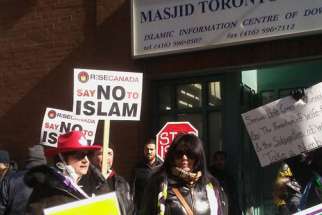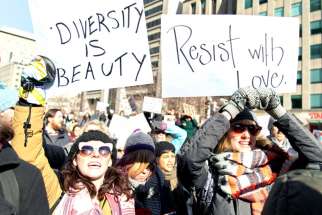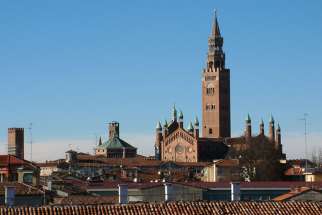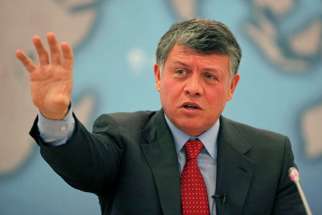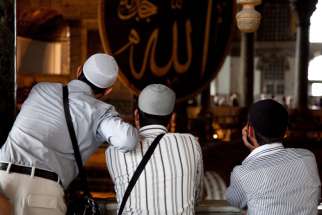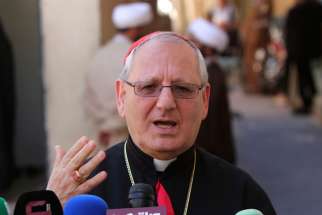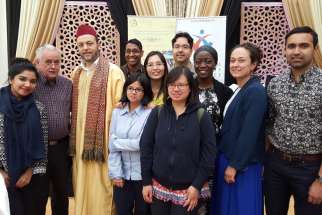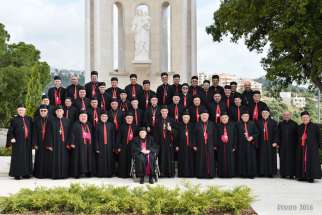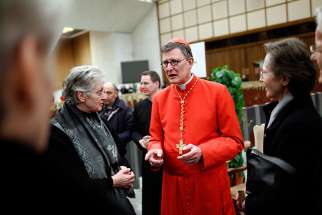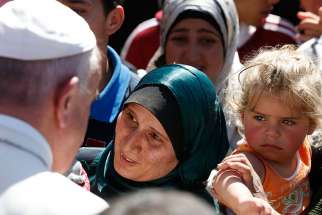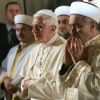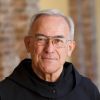A surge in vandalism and hate speech against Jews and Muslims has prompted a call for the revival of a national platform for Christian-Jewish or Christian-Muslim dialogue.
Toronto protesters join worldwide outrage against U.S. refugee ban
About 1,000 protesters descended on the American consulate in Toronto on Jan. 30 to protest a U.S. executive order that establishes a temporary ban on immigrants to the U.S. from seven predominantly Muslim countries.
Canada’s Christians lag behind on education levels
Canada’s Christian population is less educated than Canadian Jews, Muslims, Hindus and even those who have no religious affiliation.
Italian priest cancels Nativity display to avoid offending people
MILAN, Italy – An Italian priest is under fire from locals for deciding against setting up the typical Nativity scene in his town’s cemetery this year, Italian news source Corriere della Sera reported on Friday.
How Cat Stevens helped Nashville’s Muslims find a home
Jordan's king: Muslims must help Christians address Mideast challenges
AMMAN, Jordan – Jordan's King Abdullah II told a visiting delegation from the Middle East Council of Churches that his country has become a model for coexistence, fraternity and moderation in the Middle East.
Churchgoing Catholics least likely to hold negative views on Muslims
OTTAWA – Catholics in Quebec are more likely to hold a negative view of Muslims than Catholics across the rest of the nation, according to a new book by Reginald Bibby and Angus Reid.
BAGHDAD – Chaldean Catholic Patriarch Louis Sako of Baghdad called for a united and strong stance – by Muslims and non-Muslims alike – to stop the spread of the "cancer" of Islamic State and other terrorist groups.
Interfaith Ramadan dinner builds bonds
TORONTO – During Ramadan, Muslims across the globe share the Iftar meal each evening. Iftar allows Muslims to physically replenish the body’s energy after fasting from dawn until dusk and to mentally reflect on the beauty and sacrifice of their faith.
BEIRUT – Maronite Catholic bishops from around the world warned against plans to partition the Middle East and urged Christians to stand firm and to preserve co-existence with Muslims.
German cardinal tarred as ‘Antichrist’ for defending Muslims
A German Catholic leader’s defense of religious freedom has triggered a backlash following anti-Muslim statements by far-right politicians in the country.
'It makes you weep,' Pope says of refugees' stories
ABOARD THE PAPAL FLIGHT FROM GREECE – When an aide suggested Pope Francis offer to fly some Syrian refugees back to Rome with him, the pope said he agreed immediately because it was "an inspiration of the Holy Spirit."
Pope Benedict saw Jews, Muslims as allies in defending belief in God
VATICAN CITY - In trying to help people understand how belief in God is a natural part of life and provides grounding for the values that protect human dignity and peaceful coexistence, Pope Benedict XVI saw Jews and Muslims as natural allies.
The anxious wedge between Christians and Muslims
Pope Benedict’s XVI visit to Lebanon last month was a proud and privileged moment for Lebanese and other Christians in the region. But as the Pope spoke on behalf of peace, called for Christian unity and addressed the importance of living the interfaith reality in the region, American embassies in the Middle East and other locations around the world were under siege by Muslim crowds.
Muslim anger was aroused by an amateur film made in the United States that depicted the prophet Mohammad in disrespectful ways. Political cartoons in French newspapers quickly picked up the theme, exacerbating an already volatile situation. The issue is very sensitive to all Muslims. Even a respectful image of the prophet is forbidden.
Much of the world was left with sadness at the death of the U.S. ambassador and three colleagues who were killed when the American embassy in Benghazi, Libya, was stormed. Many in the civilized world simply do not understand why some Muslims respond so violently to a film created by a single individual. We’re left to ask: does the punishment poured out upon those embassies equal the offence?
Pope Benedict, standing shoulder to shoulder with leaders of the Christian world, along with various inter-faith leaders and a group of atheists in Assisi, Italy, in October 2011, made the following comment: “We know that terrorism is often religiously motivated and that the specifically religious character of the attacks is proposed as a justification for the reckless cruelty that considers itself entitled to disregard the rules of morality for the sake of the intended good. In this case, religion does not serve peace, but is used as a justification for violence. While we condemn terrorism of the day, it should be acknowledged that history also gives testimony that Christians have used force and violence in a way which today we acknowledge with a measure of shame.”
Most Canadian and Americans, including Canadian and American Muslims, would agree that these outrageous attacks are without justification and must be condemned. But, regrettably, there is a growing sense in the West that Muslims in general are a menace. Incidents such as these contribute another layer of undeserved resentment and suspicion of most Muslims. It is becoming more difficult for the average person in the West to believe the majority of Muslims are law-abiding, God-fearing, neighbourly people who walk the streets of our neighbourhoods and are very much committed to our same values of freedom, peace and family.
The Muslims who act violently represent a tiny percentage of the world’s Muslim population. Muslims are about a quarter of the planet’s population, about 1.6 billion people in total. In 2009, they exceeded the world’s 1.2 billion Roman Catholics (although there are 2.18 billion Christians overall) and over the next 20 years the Muslim population is projected to grow twice as fast as the rest of the world. The tendency is to regard Muslims as being Middle Eastern or south Asian but the reality is that they inhabit every continent and embody many nationalities and cultures.
So it is incumbent upon us, as Christians, to not paint the whole Muslim world with the same brush of suspicion. Islam is one of three world monotheistic religions, joining Christianity and Judaism. In Islam, Jesus is revered as a prophet but not as divine, while Mary is honoured and mentioned more often in the Quran than in the New Testament. Like Christians, Muslims are called to love their neighbour — and most do.
When a Christian or a Muslim dishonour their neighbour, both fail in the faithfulness to which they have been called, and both must undergo a change of heart. What that means in our day-to-day lives is that if a Christian has an opportunity to befriend a Muslim based upon the Golden Rule, they should take that initiative, thus building a better world. And vice-versa.
Together, Christians and Muslims need to address the sobering question of how to overcome the ideological differences that drive such a wide wedge between them. Is the human desire for genuine peace and freedom stronger than acts of violence? Let’s pray that the answer to that question is yes.
(Fr. MacPherson, SA, is Director of Ecumenical and Interfaith Affairs for the Archdiocese of Toronto.)
Benedictine Father William Skudlarek finds dialogue with Buddhists, Muslims help his prayer life
ROME (CNS) -- Benedictine Father William Skudlarek said Buddhists have helped him learn to listen more when he prays, and Muslims have helped him show deeper reverence in prayer.
Skudlarek, a member of St. John's Abbey in Collegeville, Minn., is secretary-general of the international Monastic Interreligious Dialogue, a project of Benedictine and Trappist monks and nuns that promotes dialogue with Buddhists, Hindus and Muslims in some version of monastic life.
He was in Rome Sept. 17-25 to lead a workshop for members of the Congress of Abbots of the Benedictine Confederation of Monastic Communities.
The monastic dialogue began in the 1970s, and Skudlarek began participating in the mid-1990s.
The Benedictine said his contact with Buddhists has led him, twice a day, to sit in silence like Buddhists do when they meditate.
"I don't know if I can exactly describe what I've gotten from that, but I sense I've gotten something," Skudlarek said.
"I think I've come to a much deeper understanding of prayer as simply pure receptivity," he said. "I'm not there to tell God anything that God doesn't already know. I'm simply there and I'm simply present."
Skudlarek said he was also impressed by the committed celibacy of Buddhist monks, who don't have the motivation of following Jesus' example of total dedication to ministry.
In his more limited contact with Muslims, he has been struck by their dedication to praying five times a day.
Muslim prayer can seem very "formalistic" in its gestures and words, the Benedictine said, but he has come to recognize it as "a deeply spiritual path. It comes out of a sense of wanting to be totally faithful to God."
Muslims at prayer express "an almost palpable reverence, an incredible reverence," he said. "I look on my own prayer, and so much Christian prayer, and it seems sloppy by comparison. It just seems like it's too informal."
Exposure to Muslim prayer has increased his appreciation of the formal, communal prayers that mark his life as a Catholic monk, he said, teaching him to see them "not just as legalistic formalities, but as a way of heightening one's sense of what one is doing."
On the other hand, Skudlarek said, the Christian belief that God became human in Jesus Christ gives Christian prayer a "familial sense" that Islam, with its emphasis on the utter transcendence of God, does not have.
Although the monks and nuns engaged in the dialogue do discuss questions of theology, their focus is on "spiritual experience and spiritual practice," he said.
Catholic monks and nuns find common ground with Buddhists, and with Muslims practicing Sufism, or Islamic mysticism, in a regulated religious life devoted largely to contemplation, he said.
Monasticism is "a search for God, ultimately," and Catholic monks and nuns "are interested in how others search for what they would refer to as ultimate value or ultimate meaning," he said.
"This makes it sound very deep, very serious, but my experience of dialogue is what really happens, in the first place, is that we become friends with each other" and recognize that "all of us have more questions than answers," he said. "All of us are still searching."
In many ways, "it is not that we are on different paths all going up the mountain and going toward the same goal," Skudlarek said. "We are on the same path going in different directions ... we're ending up in different places."
"The way a Buddhist describes 'nirvana' is quite different from the way a Christian -- and maybe a Muslim and a Jew -- would describe heaven or paradise," he said.
"Don't ask me to explain that," Skudlarek said, "that's the theologians' work."


